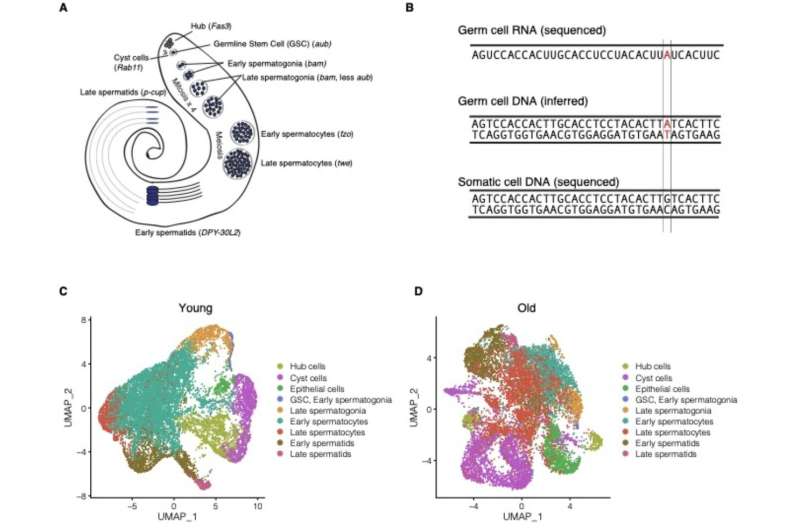This article has been reviewed according to Science X's editorial process and policies. Editors have highlighted the following attributes while ensuring the content's credibility:
fact-checked
peer-reviewed publication
trusted source
proofread
Why older fathers pass on more genetic mutations to their offspring

The male reproductive system serves as a hotspot for the emergence of new genes. Perhaps that explains why more new mutations are inherited from fathers than from mothers. It doesn't, however, clarify why older fathers pass on more mutations than younger ones do. The mechanisms that might underlie these well-documented trends have long remained a mystery.
Now, a new study in Nature Ecology & Evolution by Rockefeller University scientists describes why older male fruit flies are more likely to pass mutations onto their offspring, potentially shining a light on inherited-disease risk in humans.
Researchers in Li Zhao's lab studied mutations that occur during the production of sperm from germline cells, known as spermatogenesis. They found that mutations are common in the testes of both young and old fruit flies, but more abundant in older flies from the outset. Moreover, many of these mutations seem to be removed in younger fruit flies during spermatogenesis by the body's genomic repair mechanisms—but they fail to be fixed in the testes of older flies.
"We were trying to test whether the older germline is less efficient at mutation repair, or whether the older germline just starts out more mutated," says first author Ewan Witt, a former graduate student in the lab and now a computational biologist at Biomarin Pharmaceuticals. "Our results indicate that it's actually both. At every stage of spermatogenesis, there are more mutations per RNA molecule in older flies than in younger flies."
Self-care at the genetic level
Genomes keep themselves tidy using a handful of repair mechanisms. When it comes to testes, they have to work overtime; testes have the highest rate of gene expression of any organ. Moreover, genes that are highly expressed in spermatogenesis tend to have fewer mutations than those that are not. This sounds counterintuitive, but it makes sense: One theory to explain why the testes express so many genes holds that it might be a sort of genomic surveillance mechanism—a way to reveal, and then weed out, problematic mutations.
But when it comes to older sperm, the researchers found, the weed-whacker apparently sputters out. Previous research suggests that a faulty transcription-coupled repair mechanism, which only fixes transcribed genes, could be to blame.
Inherited or new mutations?
To get these results, scientists in the Laboratory of Evolutionary Genetics and Genomics did single-cell sequencing on the RNA from the testes of about 300 fruit flies, roughly half of them young (48 hours old) and half old (25 days old), advancing a line of inquiry they began in 2019. In order to understand whether the mutations they detected were somatic, or inherited from the flies' parents, or de novo—arising in the individual fly's germline—they then sequenced the genome of each fly.
They were able to document that each mutation was a true original. "We can directly say this mutation was not present in the DNA of that same fly in its somatic cells," says Witt. "We know that it's a de novo mutation."
This unconventional approach—inferring genomic mutations from single-cell RNA sequencing and then comparing them to the genomic data—allowed the researchers to match mutations to the cell type in which they occurred. "It's a good way to compare mutational load between cell types, because you can follow them throughout spermatogenesis," Witt says.
The human connection
The next step is to expand the analysis to more age groups of flies and test whether or not this transcription repair mechanism can occur—and if it does, identify the pathways responsible, Witt says. "What genes," he wonders, "are really driving the difference between old and young flies in terms of mutation repair?"
Because fruit flies have a high reproductive rate, investigating their mutation patterns can offer new insights into the effect of new mutations in human health and evolution, says Zhao.
Witt adds, "It's largely unknown whether a more mutated male germline is more or less fertile than a less mutated one. There's not been very much research on it except for at a population level. And if people inherit more mutations from aging fathers, that increases the odds of de novo genetic disorders or certain types of cancers."
More information: Li Zhao, Transcriptional and mutational signatures of the Drosophila ageing germline, Nature Ecology & Evolution (2023). DOI: 10.1038/s41559-022-01958-x. www.nature.com/articles/s41559-022-01958-x
Journal information: Nature Ecology & Evolution
Provided by Rockefeller University




















